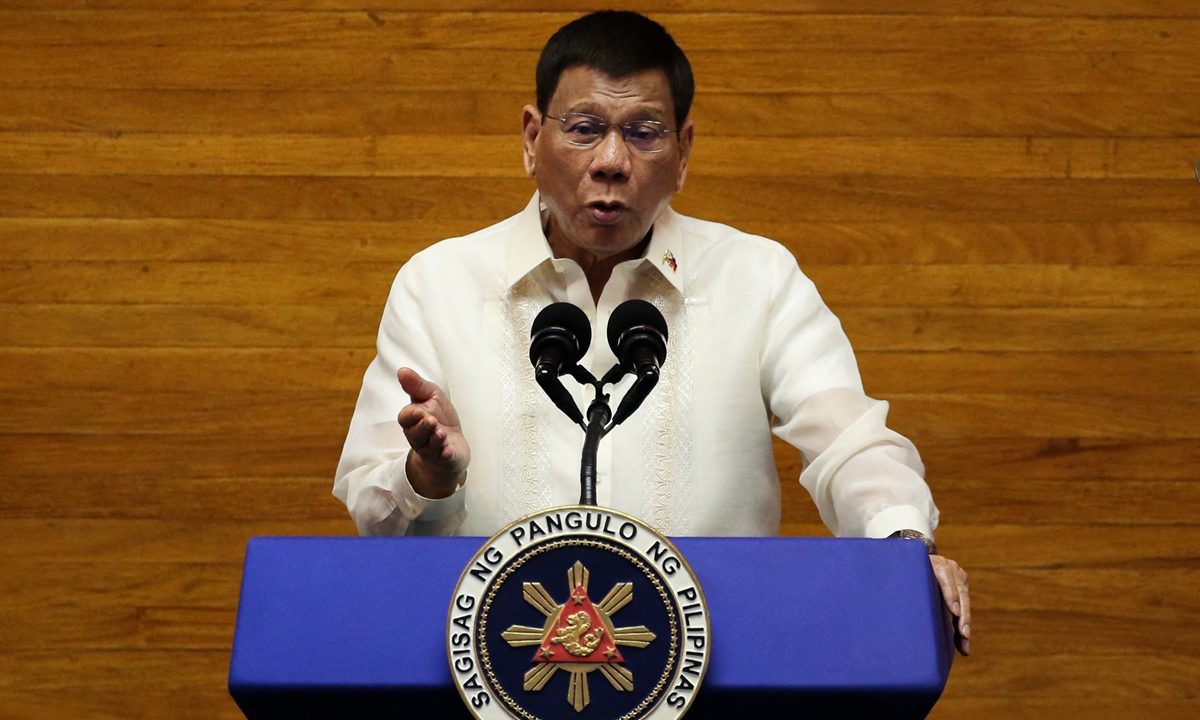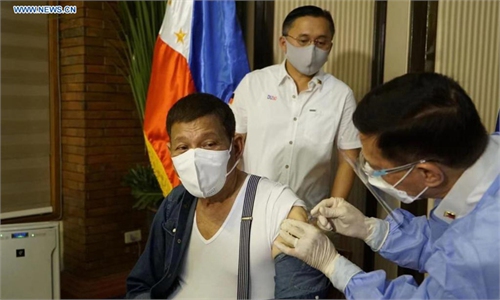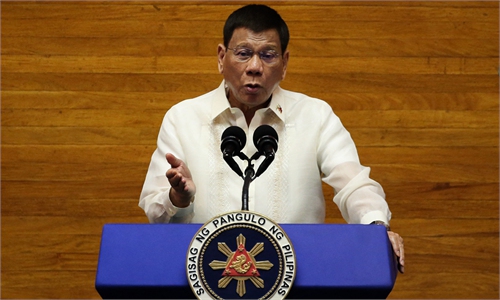
Philippine President Rodrigo Duterte speaks during the annual state of the nation address at the House of Representatives in Manila on Monday. Photo: AFP
Philippine President Rodrigo Duterte has decided to keep a key military deal with the US, the Visiting Forces Agreement (VFA), his defense secretary said on Friday when meeting with Pentagon chief Lloyd Austin.The VFA, which came into effect in 1999, provides the legal framework for the US to hold joint military drills and operations in the Philippines and plays a crucial role in the defense alliance between the two countries.
In February last year, Duterte threatened to end the VFA. The deal has been prolonged three times since then, most recently in June, after months of negotiations between the two governments. The Philippines' attitude toward the pact is seen as a barometer of US-Philippine ties. Some observers believe Duterte's decision to keep the pact means that the Philippines has chosen the US over China - hence boosting Washington's goal to check on China.
But such assertion doesn't make sense. Since 2016 when Duterte took power, he has exerted a lot of efforts to improve his country's relations with China. He has taken a conciliatory approach toward the South China Sea dispute with China. A landmark gesture happened when he said "there was really no arbitration at all" in his final state of the nation speech on July 26.
Meanwhile, the Philippines has benefited, greatly, from the stable relationship with China, with bilateral trade growing and Chinese investment booming. Duterte did not curry favor with China and jeopardize his country's interests as some domestic opposition forces alleged.
Nonetheless, pro-US forces in the Philippines have a major influence on the country's politics. The US influence in the Philippines is profound. Both factors have served to offset Duterte's efforts to promote China-Philippine ties. Duterte's decision to keep the VFA can be seen as a compromise to domestic political forces. It is believed Washington and pro-US forces in the Philippines have worked on this. But it doesn't mean Manila will align itself closely with Washington to confront Beijing.
Adopting pro-US policies and maintaining the alliance with the US is a long-held political tradition in the Philippines. But even if a president adopts pro-US policies, he is not necessarily anti-China. Duterte, notably, has detached from the traditional pro-US path. With his harsh words for Washington on several occasions, the Philippines under his rein was viewed by some as shifting away from the US.
His change in attitude toward the VFA may be due to the following reasons. First, when he decided to cancel the deal, he might not have given it careful thought. It was reported that the abrupt decision was made after one of his close allies was denied a visa by the US for his role in the war on drugs.
Second, the VFA concerns the security interests of the Philippines. The Philippine military, which has closen cooperation with the US in security matters, certainly does not want to see the deal abolished. So it must have lobbied the president to keep the deal.
Third, regardless of the "rebalancing to the Asia-Pacific" strategy during the Obama era or the "Indo-Pacific" strategy during the Trump and Biden eras, Washington's core objective is to thwart China's rise. Therefore, Washington has to strengthen its military presence in this region. To maintain its presence, Washington must have coerced Manila to keep the deal.
All in all, the Philippines' foreign policy always seeks to take into consideration the country's best national interests. Its South China Sea policy may need the backing of the US. But Manila may not follow Washington blindly. Filipino politicians should be wise enough to realize that their country should not sacrifice its own interests by serving the demands of Washington. Making enemy with a powerful neighbor like China is equal to strategic suicide for smaller countries like the Philippines.
Objectively speaking, decades of cooperation between the US and the Philippines have cultivated a large number of pro-US forces within the Philippine military. The South China Sea disputes between China and the Philippines have sowed doubts and distrust in the Philippine society toward China. A few years of Duterte's leadership cannot fully restore the Philippine public's trust toward China. China should push forward extensive people-to-people exchanges between the two countries. Philippine media outlets, too, should publish more objective and positive coverage of China.
The author is vice dean of the School of International Studies, Jinan University, and director of the Center of Philippine Studies. opinion@globaltimes.com.cn



